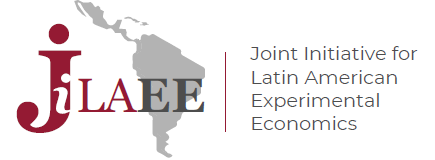
Advanced Course Series: Experimental Economics Methods
Instructor: Professor Diogo Geraldes
COURSE DESCRIPTION
In this course, we focus on methods used in experimental economics, aiming to provide participants with a “big picture” guidance for designing and conducting economic experiments. More than just theory, the course emphasizes hands-on experience: participants will have the opportunity to develop their own experimental designs and take part in a Proposal Meeting, a fundamental step that every experimentalist should go through before collecting data. Additionally, one session will be dedicated to understanding the increasing use of experimental economics methods by policymakers to induce behavior change.
Experimental economics (EE) is an expanding field that tests and suggests economic theories by analyzing decisions made by people in laboratory, field, and online experiments. Predominantly combined with behavioral economics, EE has evolved into a distinct subfield of economics. At its core, EE is an empirical research methodology that collects data in controlled environments using a toolbox that offers unique advantages for economic analysis.
*The course will be in english. The maximun capacity is 20 people so save your place as soon as you can.
TARGET AUDIENCE
This course is designed primarily for those new to experimental methods, meaning no prior knowledge is required. However, participants with prior knowledge of experimental methods who wish to brush up their skills are also welcome. Importantly, the course is not limited to economists—any researcher interested in behavioral science can benefit from attending, regardless of their academic background.
ABOUT DIOGO GERALDES (UNIVERSITY COLLEGE DUBLIN)
Diogo is an Assistant Professor at the School of Economics, University College Dublin, a Research Fellow at the Geary Institute for Public Policy, a CESifo Research Network Affiliate, and a Researcher at the Science of Diversity and Inclusion Initiative (SODI.org). In addition, Diogo serves as Co-Chair of the Irish Economic Association Behavioural Economics Network.
Diogo holds a Ph.D. in Economics from Maastricht University, a M.Sc. from Pompeu Fabra University, and a B.Sc. from Nova SBE. He has also been a visiting scholar at the University of Chicago, New York University Abu Dhabi, and Columbia University.
Go to Diogo’s Website to find out more about him.
Session 3
…Continuation from session 2
Causality and Lab Experiments
Lab Experiments and Policy: An Application in a Labor Market Context
Required Readings
Niederle, M., & Vesterlund, L. (2007). Do Women Shy Away from Competition? Do Men Compete Too Much?, Quarterly Journal of Economics, 122(3), 1067-1101.
Balafoutas, L., & Sutter, M. (2012). Affirmative Action Policies Promote Women and Do Not Harm Efficiency in the Laboratory. Science, 335, 579-82.
Marie, O., & Zölitz, U. (2017). “High” achievers? Cannabis access and academic performance. The Review of Economic Studies, 84(3), 1210-1237.
Geraldes, D. and Smeets, P. (2025). Women Compete More Against Women. Working paper.
Baranski, A., Geraldes, D., Kovaliukaite, A., & Tremewan, J. (2024). An experiment on gender representation in majoritarian bargaining. Management Science, 70(10), 6622-6636.
Baranski, A., Geraldes, D., & Tremewan, J. (2023). Closing the Gender Gap in Multilateral Negotiations Through Institutional Design. NYU Abu Dhabi Division of Social Sciences Working Paper, 92.
Session 2
Causality and Lab Experiments
Lab Experiments and Policy: An Application in a Labor Market Context
Required Readings
Niederle, M., & Vesterlund, L. (2007). Do Women Shy Away from Competition? Do Men Compete Too Much?, Quarterly Journal of Economics, 122(3), 1067-1101.
Balafoutas, L., & Sutter, M. (2012). Affirmative Action Policies Promote Women and Do Not Harm Efficiency in the Laboratory. Science, 335, 579-82.
Marie, O., & Zölitz, U. (2017). “High” achievers? Cannabis access and academic performance. The Review of Economic Studies, 84(3), 1210-1237.
Geraldes, D. and Smeets, P. (2025). Women Compete More Against Women. Working paper.
Baranski, A., Geraldes, D., Kovaliukaite, A., & Tremewan, J. (2024). An experiment on gender representation in majoritarian bargaining. Management Science, 70(10), 6622-6636.
Baranski, A., Geraldes, D., & Tremewan, J. (2023). Closing the Gender Gap in Multilateral Negotiations Through Institutional Design. NYU Abu Dhabi Division of Social Sciences Working Paper, 92.
Continues in session 3.
Session 1
The Neoclassical Framework and the Emergence of EE
Mapping of EE Methods
Purposes of EE Methods
Critiques to EE Methods
Required Readings
Geraldes, D. (2018). Relevance of Behavioral and Experimental Economics. In Chapter 1. Essays on competitive attitude: sex, stereotypes, and group membership Maastricht: Datawyse / Universitaire Pers Maastricht DOI: 10.26481/dis.20180509dg
Zizzo, D. (2010). Experimenter demand effects in economic experiments. Experimental Economics, 13, 75-98.
List, J. (2025). The Experimentalist Looks Within: Toward an Understanding of Within-Subject Experimental Designs (No. w33456). National Bureau of Economic Research.
Nosek et al. (2015). Estimating the reproducibility of psychological science. Science, 349(6251), aac4716.
Camerer et al. (2016). Evaluating replicability of laboratory experiments in economics. Science, 351(6280), 1433-1436.
